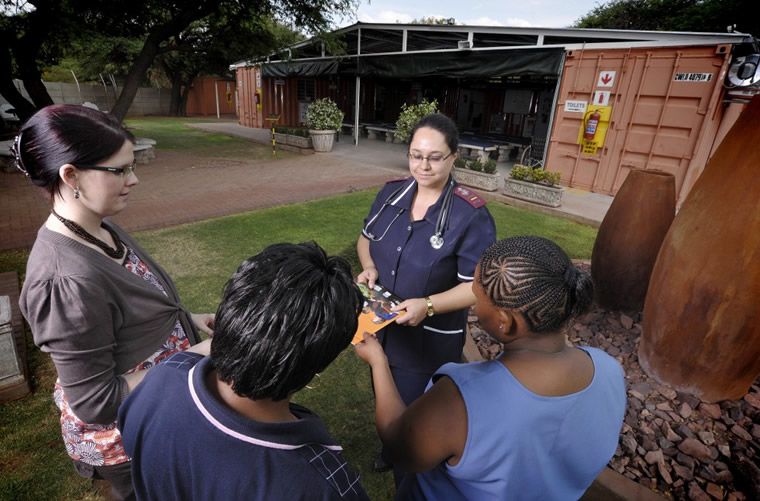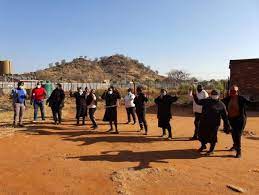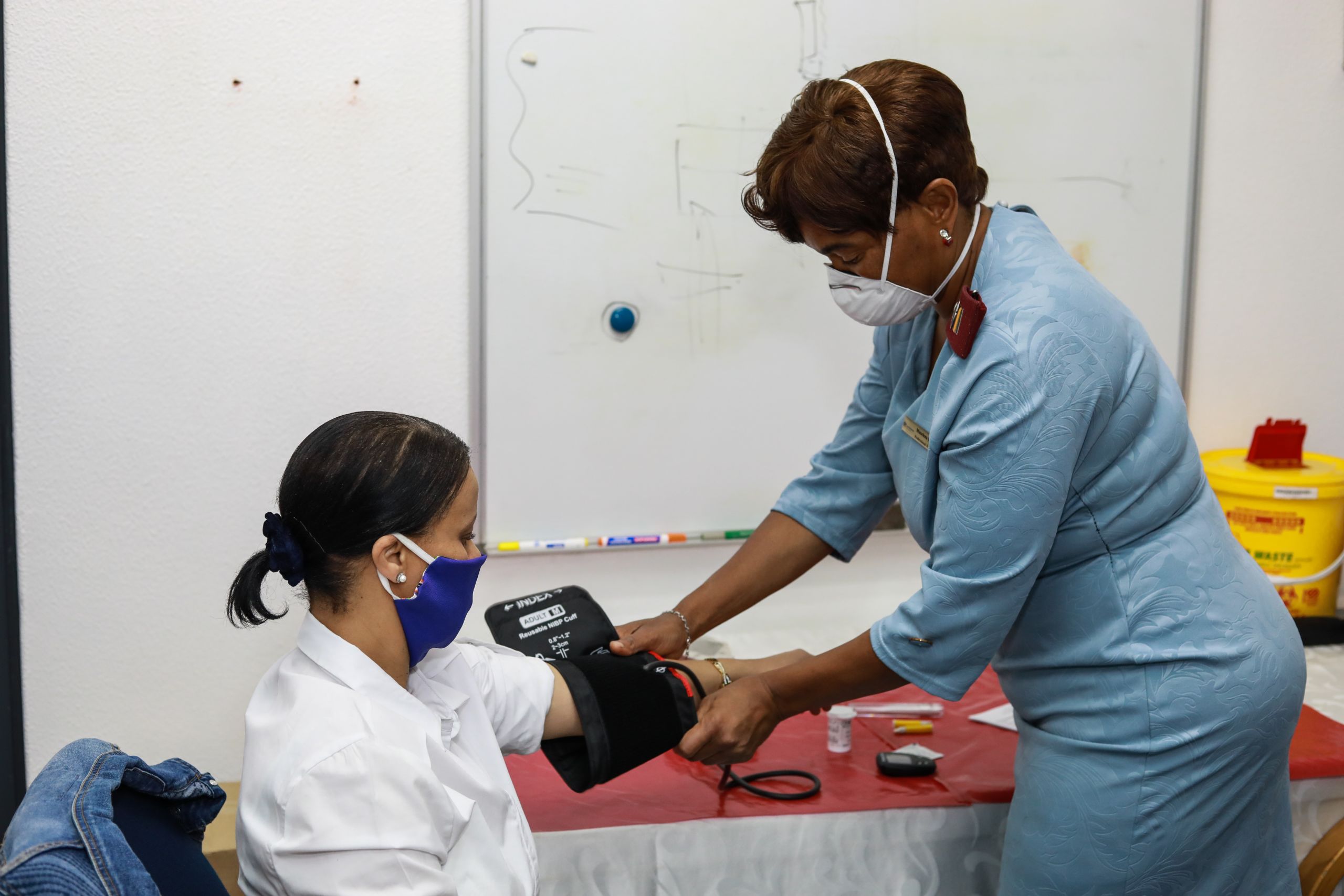BETTER HEALTH BEGINS AT HOME

Good healthcare outcomes don’t come from spending more money, rather they come from an integrated approach that hears the health and social needs in communities and acts on them. A model called Community-Oriented Primary Care (COPC) is designed to do just that. It focuses on starting healthcare at a household level.
Initially developed by the department of family medicine at the University of Pretoria (UP), COPC has been successful in several municipalities countrywide, and was recently adopted and scaled by The Impact Catalyst. This initiative, founded by mining giant Anglo American, entails close collaboration with partners across sectors to bring about sustainable socioeconomic change on a regional scale.
Besides Anglo American, mining company Exxaro, the Council for Scientific and Industrial Research, World Vision SA (an NGO with international experience in development), the engineering firm Zutari and the Industrial Development Corporation, a state-owned development financier, are on board. Government, on a provincial level, is an integral partner in delivering sustainable socioeconomic benefits in the most rural and impoverished regions in South Africa.
Dr Suzi Malan from the COPC research unit, department of family medicine at UP, says: “The Impact Catalyst initiative is a perfect example of how the private sector can accelerate impact in communities when resources are combined with government sector efforts. Healthcare in rural areas constantly suffers from a lack of resources due to many factors, and the concerted effort by The Impact Catalyst partners to support the department of health with resources including training, IT and internet connectivity goes a long way towards creating positive spin-offs such as improved relationships, connecting partners and better health literacy for individual community members.”
The focus of COPC is to start at household level, says Malan. The department of health employs community health workers (CHWs) who fulfil this indispensable role in their communities, but they have limited training, resources are scarce and they are often under-supported.
For a few years now, UP has worked in different municipalities to support CHWs in the form of weekly integrated training sessions to complement the two weeks of upfront training by the department.
Malan says: “We strive towards a system of continuous learning, mainly through clinical associates we hire. Clinical associates support the role of weekly learning and support clinical services.”
A clinical associate has the scope of practice between that of a nurse and a medical doctor. It is a three-year-degree offered by UP, Wits University and Walter Sisulu University.
About 100 clinical associates are deployed to all Anglo American mining sites and will in future also work from Exxaro mines. From there, they build relationships within communities to help assess needs, identify problems, offer advice and keep COPC managers updated on their work and progress.
Currently, 133 health clinics are involved, close to 1 700 CHWs will have received training when all is said and done, and a total of 2.7 million people will benefit from the programme, says Malan.
Mpho Kanono is one such clinical associate working in North West and Limpopo. Previously, he worked with military personnel and helped HIV and diabetes patients in clinics, but when he was offered a job on a mining site at the onset of Covid-19, he jumped at the opportunity.
A lot of his work over the past 18 months has involved community testing and tracing, as well as educating people about Covid-19 and getting them vaccinated, and he did many home visits with CHWs to check in on patients.
Kanono also works with NGOs, centres for substance abusers and victims of gender-based violence, church institutions and tribal leaders to facilitate communication and build collaborative projects. The feedback from the community services he liaises with is positive and proves the sustainability of the initiative.
Dr Pertunia Kupa from Thabazimbi Hospital says clinical associates such as Kanono at Amandelbult mine have helped with successful Covid-19 vaccination drives.
“Their work helps to strengthen public-private partnerships as we continuously strive towards our goal of providing consistent, accessible and efficient healthcare in the Thabazimbi subdistrict.”
Lesego Monnathoko, a counsellor at the Botshabelo Crisis Centre for survivors of gender-based violence and sexual abuse in Mogwase, says Kanono delivers much-needed resources and connects relevant people and institutions so they can work together.
The feedback from Apostle Boitumelo Khonou from St Catherine Hospice in Mogwase is equally positive and, thanks to valuable information from Kanono on how the hospice and hospice workers can improve their services, they now collaborate better with the community clinic and community health workers.

For Siyabinga Mfanasibili Mngomezulu, an employee at Anglo Platinum Amandelbult section, the initiative helped to keep him safe when he contracted Covid-19 last year. He phoned Kanono regularly to ask questions about his condition and Kanono soon connected him with a community health worker who kept an eye on him, visited regularly and arranged medication and food parcels to be delivered.
“Mpho even helped me with a water project installation where I live. We are still in touch,” says Mngomezulu.
UP’s department of family medicine says patients can, through coordinated care, be released to their homes, where CHWs can attend to their needs with regular visits. These workers are ideally placed to pick up problems such as hunger and malnutrition or other social challenges. Health professionals and community workers communicate regularly to discuss cases, treatment, progress and aftercare.
Sister Mmabatho Tlhakola, outreach team leader in Mogwase Community Health Clinic CHC and a registered nurse, confirms this: “The CHWs under my supervision and I cherish the support from Mpho Kanono. It is especially helpful when we do house visits and can discuss cases afterwards. He is very passionate and committed to community work. He always brings valuable insight to our work together.”
Some of the areas already benefiting from the COPC programme include Namaqua, Kimberley and Kathu (Northern Cape), Parys and Kroonstad (Free State), Nkangala and Gert Sibande (Mpumalanga), Thabazimbi, Polokwane, Mogalakwena, Steelpoort and Burgersfort (Limpopo), and Bojanala (North West).

